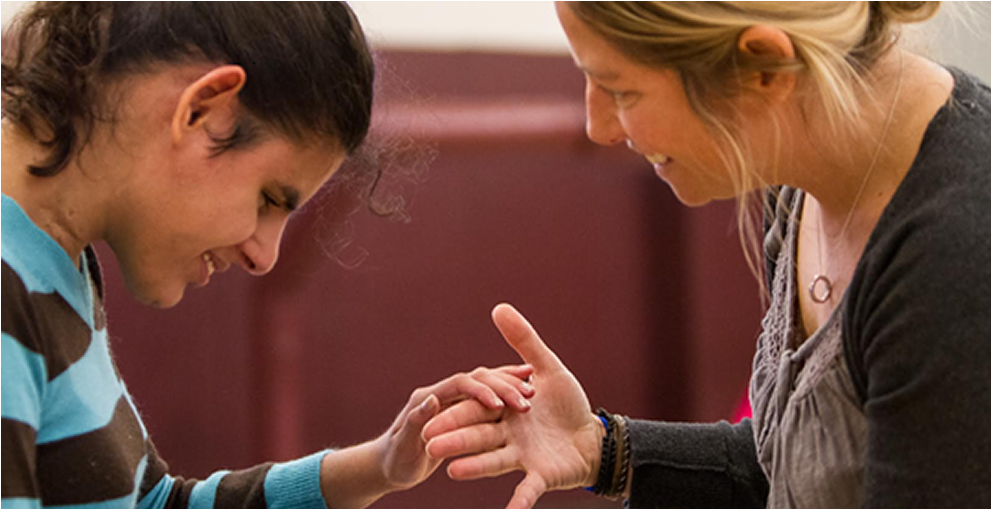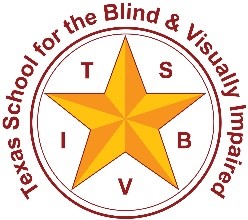Podcasts
 Texas Deafblind Project has created numerous podcasts. These are available for viewing on demand. Some of these materials are also approved for continuing education units (CEU) for ACVREP and the Texas State Board of Education Certification. Please visit the TSBVI website and complete a delayed viewing request form to receive credit. Not all of the materials listed below provide CEUs.
Texas Deafblind Project has created numerous podcasts. These are available for viewing on demand. Some of these materials are also approved for continuing education units (CEU) for ACVREP and the Texas State Board of Education Certification. Please visit the TSBVI website and complete a delayed viewing request form to receive credit. Not all of the materials listed below provide CEUs.
A Sense of Texas Podcasts
A Sense of Texas Podcast- TDB Pilot
Many difficulties arise when teaching a student who is hard of hearing or who has a visual impairment. When you combine the two it brings up a whole new set of challenges that not many of us are trained to deal with. Chris Montgomery, Deafblind Consultant from TSBVI Outreach, joins us today to discuss how the Teacher of Students who are Deafblind (TDB) Pilot program could help create more positive outcomes for individuals who are Deafblind in your classroom and beyond.
A Sense of Texas Podcast- Early Childhood Intervention
It’s often hard to track how a toddler is developing but if you suspect there is a problem getting them help early can vastly improve outcomes. Guest host Kate Borg, TSBVI Outreach Director, joins the podcast this week with TSBVI Outreach Consultants Kathi Garza, Deanna Peterson, and Mary Shore to discuss ECI (Early Childhood Intervention) and how it’s helping toddlers with visual impairments achieve milestones in early development.
A Sense of Texas Podcast- O&M at a Distance
At the very least, Spring 2020 saw school systems scrambling to maintain their educational mandate for their students. Few experienced the challenges of distance learning more than those who teach O&M, the most physically contacted part of education for those who are blind or visually impaired. We are fortunate to have specialists like Chris Tabb, O&M Consultant with Outreach, in the field to bring their curiosity and voracious appetite for information to the rescue.
A Sense of Texas Podcast- Barbara Miles
Barbara Miles has been a leader in the field of Deafblind education for as long as we can remember. Before her recent retirement she hosted a workshop at TSBVI and was kind enough to sit down with our own Matt Schultz and Chris Montgomery to talk about communication and building relationships with our students and what she hopes to see in the field of Deafblind education going forward.
A Sense of Texas Podcast-Emotional Literacy
When a child resists being taught, what is the problem? Is it simply behavioral? Is is a failure of teaching skill? Emily speaks with TSBVI Outreach Consultant Scott Baltisberger about his recent article in TX SenseAbilities (TSBVI’s newsletter) regarding some recent new understanding about what’s necessary to create the right environment for learning to take place. It’s both new and remarkably intuitive. After the interview, Ann Adkins- editor-in-chief of TX SenseAbilities- tells us more about the publication and how to get your own copies to read articles like Scott’s.
A Sense of Texas Podcast- Transition
Very little is more critical than finding the route our students can use to move from the world of learning to the world of doing. Helping them discover the ways and means of how they will spend the rest of their lives is a singular and all-important task. TSBVI Outreach’s David Wiley joins Emily to discuss what he’s learned in over 30 years in the field and shares an exercise many have found helpful in focusing the work of getting a child from student to productive member of society. Afterwards, Emily talks to Gabby and Robbie Caldwell- a TSBVI student and parent, respectively- about looking to the future and matching interests to goals.
A Sense of Texas Podcast- Interaction
Matt Schultz from TSBVI Outreach joins the podcast to discuss interaction and the importance of building relationships and creating space for communication initiated by our students. Edgenie Bellah chimes in as our expert at the end to focus on the family perspective and the important, irreplaceable role they play in their child’s life.
Achieved Podcasts
2017 Texas Symposium on Deafblindness
Impact of Stress on Brain Architecture and Resilience with Dr. Judy Cameron
Original webcast date: 3/3/2017
Description: Dr. Judy Cameron, Professor, University of Pittsburgh and member of the Harvard Center on Child Development, Pittsburg, PA Science tells us that early childhood is a time of both great promise and considerable risk. Having responsive relationships with adults, growth-promoting experiences, and healthy environments for all young children helps build sturdy brain architecture and the foundations of resilience. The following key scientific concept areas and their impact on child development will also be discussed: toxic stress, serve and return interactions, executive function and self regulation. Dr. Cameron will discuss the developing brain and what research shows related to the impact of stress on this development.
Download edited transcript from the Impact of Stress on Brain Architecture and Resilience and What Harvard’s Research Means for Children who are Deafblind
PLAY FULL AUDIO CLIP 1:25:46
What Harvard’s Research Means for Children who are DeafBlind with Dr. Judy Cameron, Dr. Suzanne Zeedyk, Bernadette van den Tillaart, David Brown, and Robbie Blaha
Original webcast date: 3/3/2017
Description: Dr. Judy Cameron, Professor, University of Pittsburgh and member of the Harvard Center on Child Development, Pittsburg, PA Suzanne Zeedyk, Developmental Psychologist, Founder of the Organization connected baby, Dundee, Scotland Bernadette van den Tillaart, M.Ed., Deafblind Consultant, Ohio State School for the Blind, Columbus, OH David Brown, Deafblind Consultant, San Francisco, CA Robbie Blaha, Deafblind Consultant, Texas Deafblind Outreach, Austin, TX Following Dr. Cameron’s presentation deafblind experts Bernadette van den Tillaart, Suzanne Zeedyk, David Brown and Robbie Blaha joined in a plenary discussion about how this information relates to individuals with deafblindness and what it means for us in interacting with these individuals at school, home and in the community.
Download edited transcript from the Impact of Stress on Brain Architecture and Resilience and What Harvard’s Research Means for Children who are DeafBlind
An Active Lifestyle – Two Experiences with Andrew Cohen and George Stern
Original webcast date: 3/3/2017
Description: George Stern and Andrew Cohen each talk about living active lives as individuals who are deafblind.
PLAY FULL AUDIO CLIP 0:34:34
Outdoors with and for People who are Deafblind with Dr. Joe Gibson
Original webcast date: 3/3/2017
Description: Dr. Joe Gibson, Outdoor Activities Coordinator, Sense Scotland, Glasgow, Scotland Dr. Gibson was the opening keynote speaker at the Symposium. He discussed developing an understanding of some of the theories relating to the beneficial use of the outdoor environment and how these might apply to people who are deafblind. He shared practices of and opportunities for using the outdoors with people who are deafblind and different cultural ways of using and viewing the outdoor environment.
PLAY FULL AUDIO CLIP 1:25:05
Emotional Connection for Human Health and Happiness with Dr. Suzanne Zeedyk
Original webcast date: 3/4/2017
Description: Dr. Suzanne Zeedyk, Founder of the connected baby and Research Professor at the University of Dundee, Scotland. What does emotional connection during infancy look like, and why are early experiences so important to later human functioning? In this informal workshop, Suzanne will use video footage of infants (deafblind and non-deafblind) to illuminate patterns of emotional exchange, exploring the biological consequences these early patterns hold for later development. This platform will leave us well placed to think more deeply about how the early life experiences of deafblind people, usually unknown and unconsidered, go on to affect the way they relate to practitioners, care-givers and families later in childhood and adulthood.
| Downloads: | Transcript (txt) |

